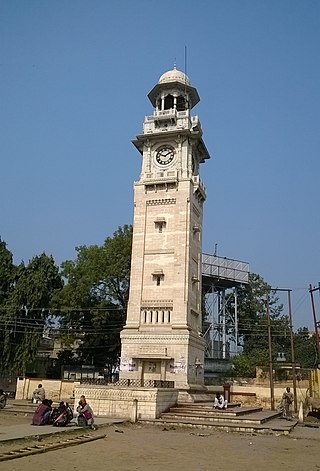
Bahraich is a city and a municipal board in Bahraich district in the state of Uttar Pradesh, India. Located on the Saryu River, a tributary of the Ghaghara river, Bahraich is 125 kilometres north-east of Lucknow, the state capital. The districts of Barabanki, Gonda, Balrampur, Lakhimpur Kheri, Shravasti and Sitapur share boundaries with Bahraich. A factor which makes this town important is the international border shared with Nepal.

The Karnali River, called Ghaghara River in India, Mapcha Tsangpo in Tibet, and the lower Ghaghara in Awadh called Sarayu River, is a perennial trans-boundary river that originates in the northern slopes of the Himalayas in the Tibetan Plateau, cuts through the Himalayas in Nepal and joins the Sharda River at Brahmaghat in India. Together they form the Ghaghara River, a major left-bank tributary of the Ganges. With a length of 507 km (315 mi), it is the longest river in Nepal. The total length of the Ghaghara up to its confluence with the Ganges at Revelganj in Bihar is 1,080 km (670 mi). It is the largest tributary of the Ganges by volume and the second largest by length after Yamuna.
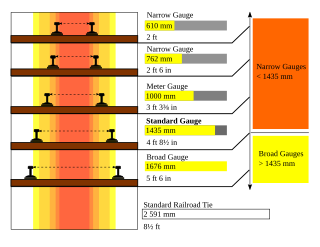
Project Unigauge, started on 1 April 1992, is an ongoing effort by Indian Railways to convert and unify all rail gauges in India to 1,676 mm broad gauge.

Barabanki Junction or Barabanki station is the intercity rail station and a commuter rail hub in the Indian city of Barabanki. It has been important junction since the days of British control of India. In its category it is one of the important stations in NER. The Barabanki Junction railway station is on the Delhi– Basti– Gorakhpur main broad-gauge route in Uttar Pradesh. Barabanki Junction is also the hub for the Barabanki–Lucknow Suburban Railway. Barabanki railway station lies in the zone of high density stations.
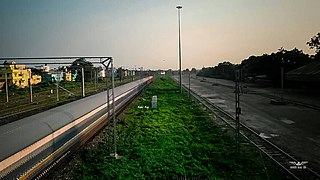
The Barauni–Katihar, Saharsa and Purnia sections of the Barauni–Guwahati line connects Barauni, Saharsa, Purnia and Katihar in the Indian state of Bihar.

The Barauni–Gorakhpur, Raxaul and Jainagar lines are a set of three lines connecting Barauni in the Indian state of Bihar with Gorakhpur in Uttar Pradesh. The lines run in an east–west direction between the Ganges and India-Nepal border, covering northern Bihar west of the Kosi river and eastern Uttar Pradesh. The southernmost of the lines connects via Hajipur Junction, Sonpur Junction,Chhapra and Siwan Junction. The central line connects via Muzaffarpur, Motihari and Sugauli. The northern line connects via Darbhanga, Sitamarhi and Raxaul. The lines have interconnections between them and the northern line has extensions to places near the India–Nepal border.
The Narkatiaganj–Bhikhna Thori line is a rail line in eastern India that connects Narkatiaganj and Bhikhna Thori near the Indo-Nepal border.
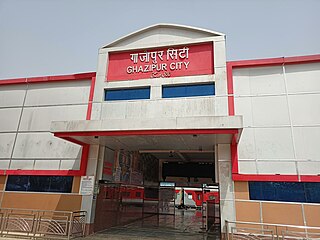
The Varanasi–Chhapra line or Chhapra–Varanasi line is a railway route on the North Eastern Railway section of Indian Railways. This route plays an important role in rail transportation of Varanasi division and Azamgarh division of Uttar Pradesh state and Saran division of Bihar state.
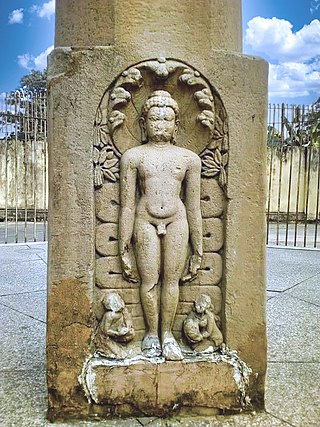
Khukhundoo, is a small town in the state of Uttar Pradesh in northern India, approximately 15 kilometres (9.3 mi) east of Deoria city near the border with Bihar state on Deoria Salempur road in Deoria district.
Padrauna railway station is on the Gorakhpur–Thawe line. It is about 77 km from Gorakhpur railway station and is situated towards its north-eastern part. It is situated about 20 km from Kushinagar, an international tourist and religious spot for Buddhists. It serves Padrauna city in the Indian state of Uttar Pradesh.
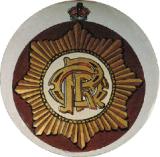
Oudh and Rohilkhand Railway was an extensive railway network in the North India, mostly north of the Ganges, starting from Benares and subsequently up to Delhi.
Elgin Bridge is a 3,695 feet (1,126 m) long railway bridge across the Ghaghra River located in Barabanki district. The bridge falls on the Barabanki-Gonda section of the North Eastern Railway zone of Indian Railways. The bridge is about 72 kilometres (45 mi) from Lucknow and stands at periodically changing confluence of two rivers i.e. Sharda River and Ghaghara River. The bridge was built on dry land and then the river was trained under it.

Rohilkund and Kumaon Railway (R&KR) was a metre gauge railway in India covering a total network of 592 miles (953 km). It was owned and worked by the Rohilkund and Kumaon Railway Company. The Rohilkund and Kumaon Railway was transferred to the Government of India and merged into the Oudh and Tirhut Railway on 1 January 1943.
Cawnpore–Barabanki Railway (C–B) (1943-1953) (earlier called Cawnpore–Burhwal Railway was a railway in northern India. It was managed as part of the East Indian Railway, and was worked by the Bengal and North Western Railway and the Rohilkund and Kumaon Railway.

The Varanasi–Ayodhya–Lucknow line is a railway line connecting Varanasi and Lucknow, both in the Indian state of Uttar Pradesh. The main line was subsequently extended to Bareilly, Moradabad and Saharanpur and the entire line was thought of as the "main line" of Oudh and Rohilkhand Railway. An important branch line, the Prayagraj–Ayodhya line, which meets the main line almost at right angles, is included here. The main line is under the administrative jurisdiction of Northern Railway, a portion of the branch line is under the jurisdiction of North Central Railway.

The 15909 / 15910 Avadh Assam Express is an express train operated by Northeast Frontier Railway that runs between Dibrugarh railway station of Dibrugarh, Assam and Lalgarh Junction of Bikaner, Rajasthan in India.
The Muzaffarpur–Gorakhpur line is a set of three lines connecting Muzaffarpur in the Indian state of Bihar with Gorakhpur in Uttar Pradesh. The lines run in an east–west direction between the Gandak and India–Nepal border, covering North Bihar west of the Kosi river and eastern Uttar Pradesh. The southernmost of the three lines connects via Hajipur Junction, Sonpur Junction and Chhapra. The central line connects via Motihari and Sugauli. The northern line connects via Sitamarhi and Raxaul. The lines have interconnections between them and the northern line has extensions to places near the India–Nepal border.

The Lucknow–Gorakhpur line is a railway route in Uttar Pradesh. It is classified as 'B special class' according to Indian Railways standards, and its trains can reach up to 123 kilometres per hour (76 mph) on this line. The line is doubled broad gauge and electrified, and it is the first fully electrified railway line of the North Eastern Railway zone.
The Chhapra–Lucknow Junction Express is an Express train belonging to North Eastern Railway zone that runs between Chhapra Junction and Lucknow Junction in India. It is currently being operated with 15053/15054 train numbers on a daily basis.
Tamkuhi Road railway station is a second important railway station of Kushinagar district after Padrauna of Uttar Pradesh. Its code is TOI. It serves Tamkuhi Road town. The station consists of two platforms. The platforms are not well sheltered. It lacks many facilities including water and sanitation.














